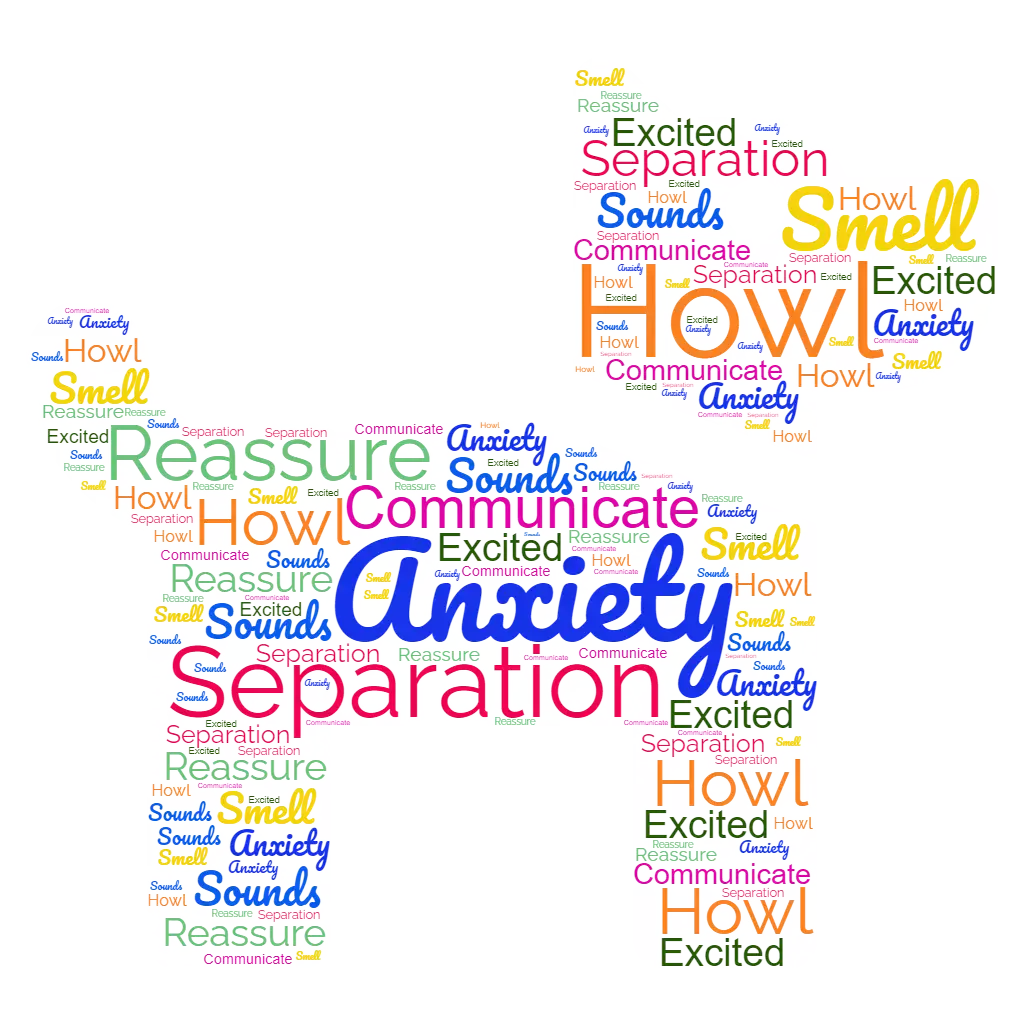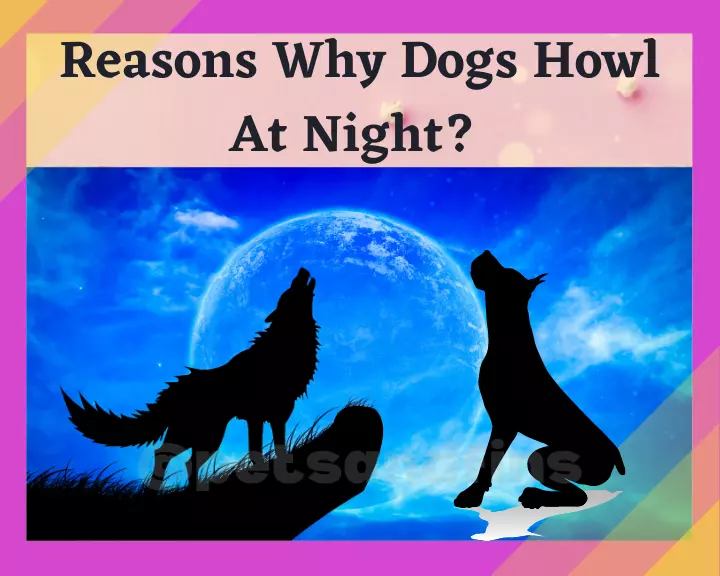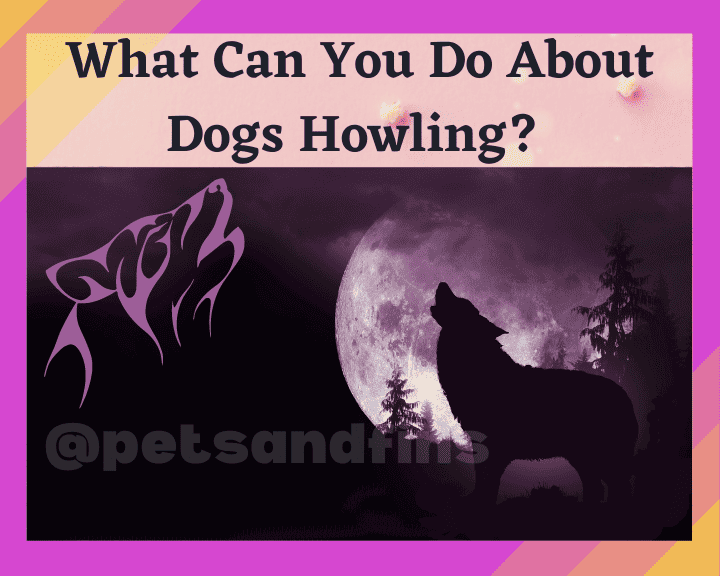Do you ever wonder why your dog starts howling at night? It can be a bit of a mystery, especially if your dog usually doesn’t make noise other than when he or she is barking. In this blog post, we will explore the reasons why dogs howl at night. We will also discuss some things that you can do to help reduce this behavior.
Dogs howling at night can be a result of many things like anxiety, separation, behavior problems, and seeking attention. There are ways to help your dog such as using music, lavender oil, desensitizing them to the sound, or counter conditioning. Remember it’s important to let your dog express themselves when in distress and don’t punish them for vocalizing.

Reasons Why Dogs Howl At Night

Anxiety
Dogs howl at night for a variety of reasons, but the most common reason is because they’re feeling anxious. Dogs often howl when they hear things that they don’t understand. This might be because of a noise outside, or because they’re alone in the dark.
They may be picking up on anxiety due to things like movement of nocturnal animals or other noises. In most cases, it’s best to try and identify what’s causing the dog’s anxiety and address that directly. You can try leaving a small light on which may comfort the dog.
Separation
If you’ve ever been woken up in the middle of the night by a dog howling, you’re probably wondering why they do this. There are actually a few different reasons why dogs may howl at night. One reason is that they are separated from their owner and may be feeling anxious or lonely.
Dogs are social creatures and can get pretty attached to their owners. So, if they’re suddenly left alone at night, it’s not surprising that they might start howling due to want of company.
Automatic Behaviour
Dogs howling at night is a natural behavior. They may be howling for a variety of reasons, including to communicate with other dogs. Dogs are pack animals and they often howl in response to the pack’s call.
Howling is also a natural behavior for dogs and it’s something they do instinctively. Having descended from the wolves, howling is a natural instinct in dogs.
Warn Trespassers
One theory is that they’re trying to warn the owner about potential trespassers. Dogs have keen hearing and can pick up on sounds that we humans can’t, so it’s possible that they’re hearing something in the distance that we’re not aware of.
So while we think there is nothing around us, dogs know better.
Call Friends
Dogs howl at night because they’re trying to communicate with their friends on the street. Dogs are pack animals and they communicate with each other vocally. By howling at night, they’re trying to send a message to their friends.
It’s essentially the canine version of sending a text message or making a phone call.
Dreams
Dogs can howl even if they are having bad or exciting dreams. It’s actually quite common for dogs to vocalize (make noise) in their sleep. Howling is simply a byproduct of dreaming. For example if a dog is chasing another dog in its dream.
Responding To Other Dogs
Dogs howling at night is a response to other dogs howling. Dogs will often join in with other dogs howling, and this chorus of dogs can be quite loud. It’s thought that the reason dogs howl at night is because they’re trying to communicate with each other.
They may be trying to let the other dogs know where they are, or they may simply be trying to socialize with the other dogs. Although they might not be audible to us, your dog catches it pretty quickly. Dogs also howl when they hear other dogs howling, because it reaffirms their social bonds within the pack.
Siren Sounds
Dogs can howl as a response to certain sounds, like ambulance sirens or car alarms. This can be even in response to thunder. These sounds seem to kindle some kind of fear or excitement in dogs. As to how dogs perceive these sounds in not known. However, it is known that dogs do react to these sounds.
Attention
Dogs howl at night for the same reason that people might call out for someone in the middle of the night. They’re seeking attention! Try giving him a warm hug and a soothing voice to calm him down. And make sure you give him plenty of love and attention during the day.
Territorial Presence
Do you ever lie in bed at night and hear a dog howling in the distance, and wonder what they’re howling about? Well, dogs howl for a variety of reasons, but one of the most common reasons is to establish their territorial presence.
By howling, they let other dogs know that this is their territory and they are visitors. It’s essentially their way of saying “stay off my turf!” Territorial howling usually occurs at night when there are fewer distractions and other sounds are clearly audible.
Excited
Howling is most often heard during the night because that’s when many animals are active and engaging in different sounds and smells that can trigger howling behavior. This in turn excites your dog. Dogs aren’t the only animals who howl either – wolves do it too!
Upset Or Irritated
Dogs may howl for a variety of reasons, but most often it is because they are upset or irritated. For example, dogs may howl in response to a loud noise (such as a passing car or fireworks) or when they’re left alone for an extended period of time.
Dogs may also dislike it when animals treading their territory and they are caged and unable to prowl. This may lead to their getting upset or irritated.
Pain Due To Illness
Dogs howl when they are in any kind of pain. It can be due to an injury or illness. Dogs howl when they are in any kind of pain, either emotional or physical. They may howl to let their pack know that they’re in danger and need help, or they may howl if they’re hurt and need attention.
Dogs howl when they’re in pain for the same reason that humans moan and wail: It’s an involuntary way to communicate their distress. Dogs may howl for a variety of reasons including injury, illness, or age-related health problems.
Dementia
Dogs howl for a variety of reasons, but one common reason is dementia. Dogs with dementia often become restless and start pacing and howling at night. The may perceive things which are not there. Other symptoms of canine dementia include disorientation, aggression, and urinating.
If you think your dog might have dementia, it’s important to take him to the veterinarian for diagnosis and treatment. There are medications available that can help improve the quality of life for dogs with dementia.
Boredom
Dogs howl when they are bored, because it’s one way to communicate with other dogs. When a dog howls, he may get a response from another dog, and this makes the world know that they’re alive and kicking too! This eliminates the boredom.
Dogs are social animals and need quite a bit of stimulation in order to stay happy and healthy. If they are left alone for long periods of time, they may start to become anxious or restless, which could lead to howling.
Problem In Sleeping Environment
There are a few reasons why dogs might howl at night. One reason is that they’re not comfortable with their sleeping environment. Maybe their bed is too hard or too soft, or maybe there’s too much noise in the room for them to feel relaxed.
Whatever the case may be, if your dog isn’t happy with his sleeping arrangements, he might start howling to let you know.
Hungry
There are a few reasons why dogs might howl at night. One reason is that they may be hungry and unable to sleep. Dogs howl when they are hungry and unable to sleep.
This is because they become restless and start to howl when their stomachs are empty and they are trying to get the attention of their owners so that they can be fed.
Female On Heat
Dogs howl for a variety of reasons, but one of the most common is that they are trying to attract mates. Male dogs will often howl to let female dogs know that they are available, and females on heat will do the same to let males know that they are looking for a partner.
What Can You Do About Dogs Howling At Night?

Desensitization
Desensitization is the best way to train your dog not to howl at night. The key is to start slowly and gradually increase the volume of sound until your dog is no longer bothered by it.
Here are the basic steps:
1) Begin by playing a recording of dogs howling softly in another room while your dog is eating or playing. As soon as your dog stops paying attention to the recording, stop playing it.
2) Gradually increase the volume of the recording over time until your dog no longer shows any signs of being bothered by it.
Counter Conditioning
There are a few things you can do to help stop your dog from howling at night. One of the most effective methods is called counter conditioning. This involves training your dog to associate something pleasant with the sound of people or other dogs howling.
For example, whenever your dog starts to bark or howl, immediately give them a treat or play with them using their favorite toy. Over time, they will begin to associate the sound of people or dogs howling with something good, and will be less likely to bark or howl in response.
Spending Time
There are a few things you can do to help your dog stop howling at night. One is to spend more time with your dog during the day. Play with them, take them for walks, and give them plenty of love and attention.
This will help tire them out and make them less likely to howl at night. A tired dog is less likely to howl than one who is bored or restless.
Reassure
There are a few things you can do to help reassure your dog when he or she starts howling at night. First, make sure your pet has a comfortable place to sleep and is getting enough time with you.
You can spend time with your dog just before bed time and leave one of your clothes with him. This makes him feel reassured. Another thing you can do is create a safe and comforting environment for your dog.
This means having a quiet place for them to sleep that is away from any loud noises or commotion. Finally, make sure they have easy access to water so they stay hydrated throughout the night.
Mental Stimulation
There are a few things you can do to help your dog stay calm at night and not feel the need to howl. One is to make sure they have plenty of mental stimulation during the day. This can be in the form of exercise, training, or even just interactive games.
Dogs need both physical and mental exercise to be healthy and happy, and if they’re not getting enough of either one, they may start looking for ways to entertain themselves – like howling at night.
Some things you can do to provide your dog with mental stimulation include playing fetch or other games with them, teaching them new tricks, taking them for walks or runs in different areas, letting them explore a fenced-in area where they can smell and chase after things,
Toys
First, make sure your dog has plenty of toys to keep them occupied during the day. This will help tire them out so they’re not as restless at night. Interactive toys, like Kongs or treat puzzles, are a great way to keep your dog occupied mentally stimulated as well.
When smell of a treat puzzle attracts the dog, howling becomes secondary.
Music
Using calming music can help soothe the dog and make him feel more relaxed. Music has been established to have a calming effect on on dogs. Music has been found to reduce both stress and anxiety in dogs. Heart rate, temperature and respiratory rates were also measured in this case.
Read More at :
Effect of Music on Stress Parameters in Dogs during a Mock Veterinary Visit – PMC (nih.gov)
Calming Chew
One easy way to help stop your dog from howling at night is to give them some calming chews before bed. Calming chews can help relax your dog and make it less likely that they’ll start howling in the middle of the night.
You may also want to consider using calming aids such as lavender oil near the bedding area, the smell of which has a calming effect.
Rewarding
When your dog does not howl, reward him with a treat the next morning. He will eventually understand that howling is won’t earn him a treat and will cease doing it. When he starts howling show him the treat and take it away.
This will take a lot of patience. However, this method is the last thing to be used because your dog must not hesitate to howl and communicate pain.
Consult Behaviour Specialist
While it’s normal for dogs to bark and howl at certain things (e.g., during a storm), excessive barking or howling can be a sign of a problem behavior. If your dog is constantly barking or howling, it’s best to consult a behavior specialist for help.
There may be an underlying cause (e.g., anxiety) that is causing your dog to bark or howl, and the specialist can help you address the problem. In some cases, you may need to modify your dog’s environment or use behavioral training techniques to stop the excessive barking or howling.
Consult A Professional
Some reasons why dogs might howl at night include separation anxiety, being bored or lonely, hearing strange noises outside that scare them, or being in pain.
If you’ve tried everything and your dog is still howling at night, it’s worth consulting your veterinarian to rule out any underlying health issues.
Wrapping Up:
Dogs howling at night can be due to a variety of reasons, some of which are anxiety, separation issues, behavior problems, wanting attention or simply because they’re bored. While you may not be able to solve all of these underlying issues, there are things that you can do to help your furry friend feel better.
We’ve outlined a few methods in this blog post that should help reduce howling at night. Remember it’s important to let your dog express themselves when they’re feeling upset or distressed – otherwise they will continue to howl as a way of communicating with you.
Thanks for reading and we hope you find the information helpful!


